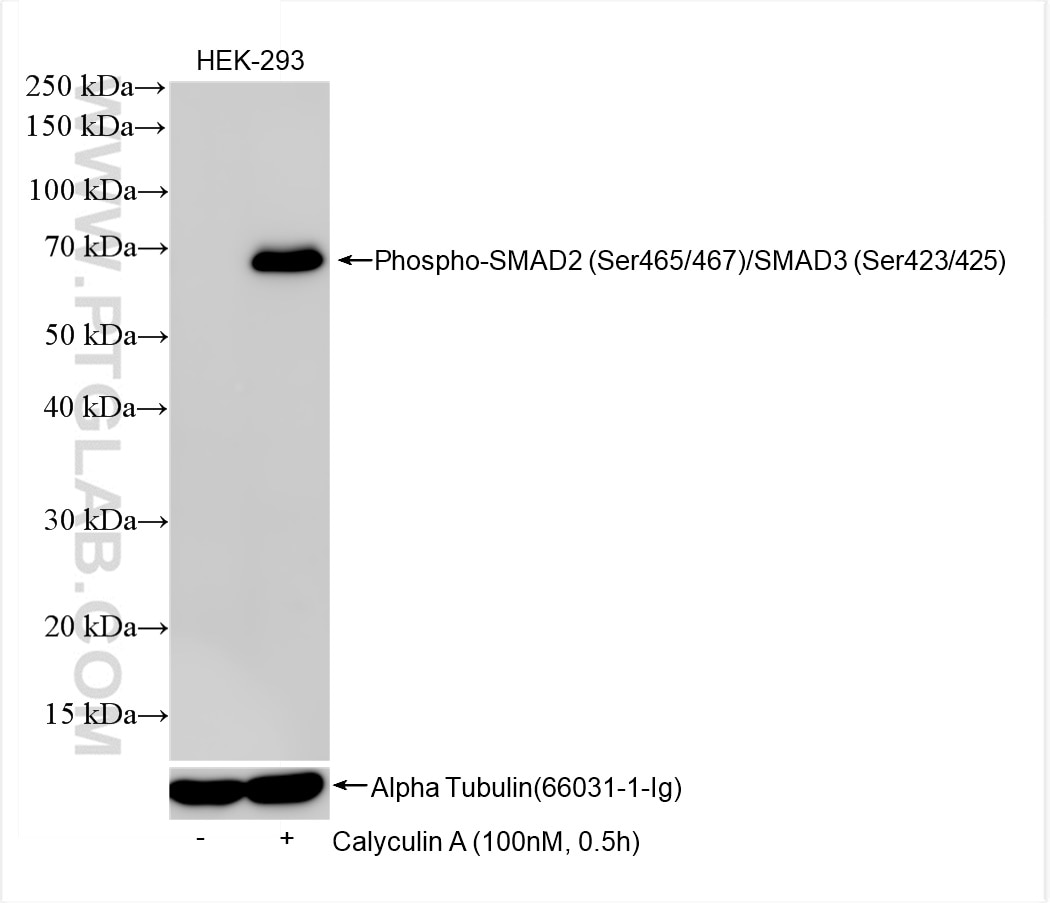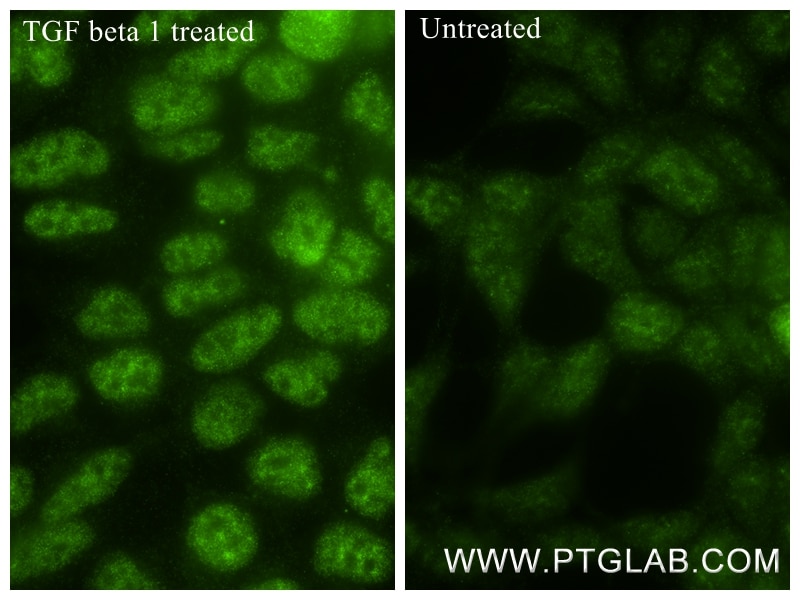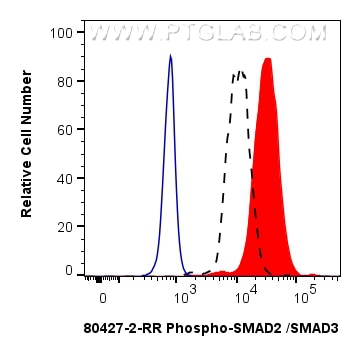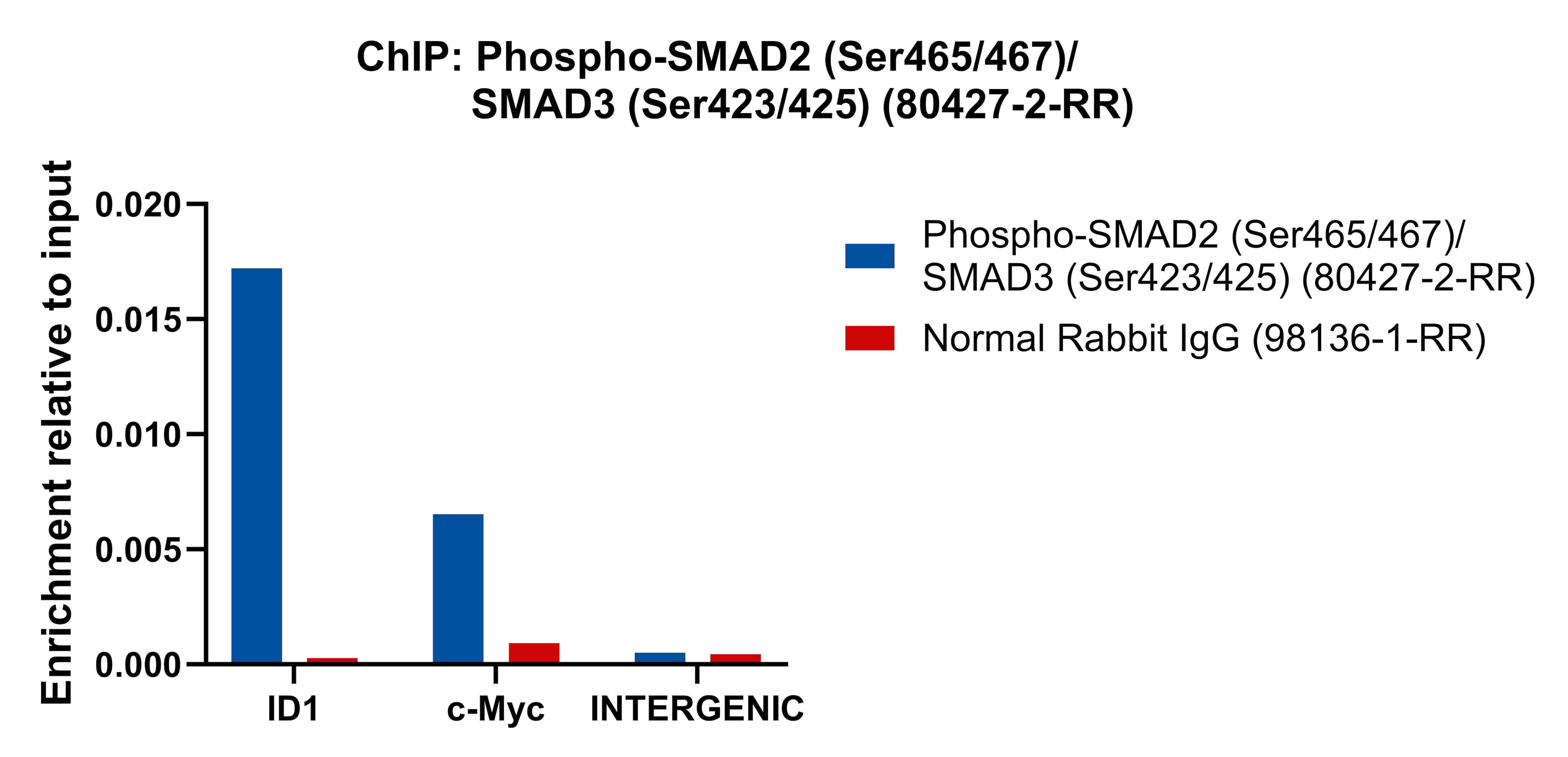Phospho-SMAD2 (Ser465/467)/SMAD3 (Ser423/425) Rekombinanter Antikörper
Phospho-SMAD2 (Ser465/467)/SMAD3 (Ser423/425) Rekombinant Antikörper für WB, IF/ICC, FC (Intra), ELISA, ChIP-qPCR
Wirt / Isotyp
Kaninchen / IgG
Getestete Reaktivität
human und mehr (2)
Anwendung
WB, IF/ICC, FC (Intra), ELISA, ChIP-qPCR
Konjugation
Unkonjugiert
CloneNo.
240826D11
Kat-Nr. : 80427-2-RR
Synonyme
Geprüfte Anwendungen
| Erfolgreiche Detektion in WB | Mit Calyculin A behandelte HEK-293-Zellen |
| Erfolgreiche Detektion in IF/ICC | TGF beta 1 treated HEK-293 cells |
| Erfolgreiche Detektion in FC (Intra) | Mit Calyculin A behandelte HEK-293-Zellen |
| Erfolgreiche Detektion in ChIP-qPCR | TGF-β1 (7 ng/ml, 1 h) HaCaT cells |
Empfohlene Verdünnung
| Anwendung | Verdünnung |
|---|---|
| Western Blot (WB) | WB : 1:1000-1:4000 |
| Immunfluoreszenz (IF)/ICC | IF/ICC : 1:250-1:1000 |
| Durchflusszytometrie (FC) (INTRA) | FC (INTRA) : 0.13 ug per 10^6 cells in a 100 µl suspension |
| CHImmunpräzipitation (IP)-QPCR | CHIP-QPCR : 1:10-1:100 |
| It is recommended that this reagent should be titrated in each testing system to obtain optimal results. | |
| Sample-dependent, check data in validation data gallery | |
Veröffentlichte Anwendungen
| WB | See 7 publications below |
Produktinformation
80427-2-RR bindet in WB, IF/ICC, FC (Intra), ELISA, ChIP-qPCR Phospho-SMAD2 (Ser465/467)/SMAD3 (Ser423/425) und zeigt Reaktivität mit human
| Getestete Reaktivität | human |
| In Publikationen genannte Reaktivität | human, Maus, Ratte |
| Wirt / Isotyp | Kaninchen / IgG |
| Klonalität | Rekombinant |
| Typ | Antikörper |
| Immunogen | Peptid |
| Vollständiger Name | SMAD family member 2 |
| Berechnetes Molekulargewicht | 467 aa, 52 kDa |
| Beobachtetes Molekulargewicht | 60 kDa |
| GenBank-Zugangsnummer | BC014840 |
| Gene symbol | SMAD2 |
| Gene ID (NCBI) | 4087 |
| Konjugation | Unkonjugiert |
| Form | Liquid |
| Reinigungsmethode | Protein A purfication |
| Lagerungspuffer | PBS with 0.02% sodium azide and 50% glycerol |
| Lagerungsbedingungen | Bei -20°C lagern. Nach dem Versand ein Jahr lang stabil Aliquotieren ist bei -20oC Lagerung nicht notwendig. 20ul Größen enthalten 0,1% BSA. |
Hintergrundinformationen
SMAD2, also named as MADH2 and MADR2, belongs to the dwarfin/SMAD family, contains 1 MH1 (MAD homology 1) domain and 1 MH2 (MAD homology 2) domain. SMAD2 is a receptor-regulated SMAD(R-SMAD) that is an intracellular signal transducer and transcriptional modulator activated by TGF-beta and activin type 1 receptor kinases. This protein may act as a tumor suppressor in colorectal carcinoma. It is phosphorylated on one or several of Thr-220, Ser-245, Ser-250, and Ser-255. In response to TGF-beta, It is phosphorylated on Ser-465/467 by TGF-beta and activin type 1 receptor kinases, and then able to interact with SMURF2, recruiting other proteins, such as SNON, for degradation. In response to decorin, the naturally occurring inhibitor of TGF-beta signaling, it is phosphorylated on Ser-240 by CaMK2. It is phosphorylated by MAPK3 upon EGF stimulation; which increases transcriptional activity and stability, and is blocked by calmodulin. In response to TGF-beta, it is ubiquitinated by NEDD4L, which promotes its degradation. In response to TGF-beta signaling, it is acetylated on Lys-19 by coactivators, which increases transcriptional activity. The molecular weight of unphosphorylated forms of Smad2 is 52 kDa and phosphorylated forms of Smad2 is 58 kDa. (PMID: 9006934)
Protokolle
| PRODUKTSPEZIFISCHE PROTOKOLLE | |
|---|---|
| WB protocol for Phospho-SMAD2 (Ser465/467)/SMAD3 (Ser423/425) antibody 80427-2-RR | Protokoll herunterladen |
| IF protocol for Phospho-SMAD2 (Ser465/467)/SMAD3 (Ser423/425) antibody 80427-2-RR | Protokoll herunterladen |
| STANDARD-PROTOKOLLE | |
|---|---|
| Klicken Sie hier, um unsere Standardprotokolle anzuzeigen |
Publikationen
| Species | Application | Title |
|---|---|---|
Phytomedicine ErTao decoction alleviates liver fibrosis by suppressing STING-mediated macrophages and NLRP3 inflammasome activation | ||
Bioeng Transl Med Reduced glutathione enhances adipose tissue-derived mesenchymal stem cell engraftment efficiency for liver fibrosis by targeting TGFβ1/SMAD3/NOX4 pathway | ||
Sci Rep Autophagy inhibition enhances antifibrotic potential of placental mesenchymal stem cells of fetal origin via regulating TGF-β1 mediated protein degradation of HGF | ||
Eur J Pharmacol Omentin-1 attenuates atrial fibrillation via Src/PI3K/Akt signaling-mediated anti-fibrotic effects in cardiac fibroblasts | ||
Clin Proteomics Multi-omics analyses, cell experiments, and network pharmacology tools identified key proteins and candidate drugs for alopecia areata treatment | ||
Cell Signal CRABP2 promotes peritoneal metastasis in CRC through TGF-β/Smad-mediated EMT signaling and invadopodia formation |





